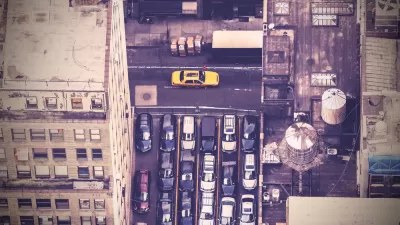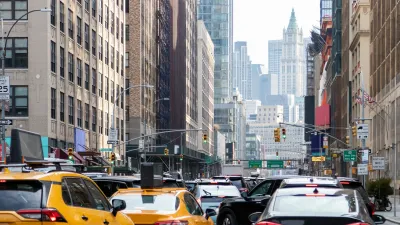Employer-paid parking will undermine New York City’s congestion tolls. But parking cash-out policies like those in California and Washington D.C. can solve the problem.

As early as June 2024, New York City intends to implement the nation's first congestion pricing program. Drivers will pay a $15 toll to enter the Central Business District—Manhattan south of 60th Street. If the congestion toll reduces traffic at a reasonable cost, other cities will surely follow. If the toll fails to perform as promised, the setback will dim the prospect of congestion pricing everywhere else.
Congestion pricing is a good idea, but a problem needs to be solved: employer-paid parking.
Employer-paid parking reduces the cost of parking at work in New York’s CBD by much more than the $15 toll will increase the cost of driving to work. The average price of off-street parking in the CBD is $655 a month. If an employer pays for employees’ parking at work, the subsidy for a commuter who drives to work 20 days a month is $34.50 a day, more than twice the $15 toll.
Equalizing incentives
A policy already adopted in California and Washington, D.C. can remove the conflict between congestion pricing and employer-paid parking. The city can require employers who offer free parking at work to offer commuters the option to choose the cash value of the free parking. Called parking cash out, this policy rewards all the alternatives to solo driving. Drivers can continue to park free at work, but some will take the cash and ride transit, carpool, bike, or walk to work.
Washington D.C. requires firms with 20 or more employees to offer parking cash out if they subsidize workplace parking. The requirement applies only to parking spaces employers lease from a third party. When a commuter cashes out a parking subsidy, the money the firm previously paid to rent a parking space pays the commuter’s cash allowance, and the firm breaks even.
Commuters who were previously offered free parking but didn’t drive to work will also receive cash. How much will this increase the employer’s costs for commuting subsidies? A study of firms that began to offer parking cash out in Los Angeles found the firms’ total costs for parking spaces and parking cash out increased by only 3 percent, a small price to pay for treating all employees equally.
The study also found that Los Angeles commuters who shifted from solo driving to public transit, carpools, cycling, and walking reduced vehicle travel to work by 12 percent, equivalent to removing from the road one of every eight cars driven to and from work.
Win-win-win
Parking cash out is flexible. Commuters can take the cash and rent a more expensive apartment within walking or biking distance of work. They might put the cash into a pension fund, converting free parking into higher retirement income. Drivers who choose cash rather than free parking can carpool, ride transit, cycle, walk to work, or work at home, all of which reduce traffic congestion.
Covid has upended the assumption that all employees commute to work every day and that parking cash out is offered on a monthly basis. For employees who occasionally work from home, some employers now offer parking cash out on a daily basis. Commuters can park free every day they drive to work, but they get the cash value of free parking every day they arrive at work without a car. Commuters can cash out on any day, and they can make different travel choices on different days. Employees who don’t commute to work don’t pay or receive anything.
Parking cash out will save money for many Manhattan commuters. Commuters who continue driving to work will pay a congestion toll of $15 a day. Those who cash out free parking will get $34.50 a day and will not pay the $15 toll, so they will save $49.50 a day. Parking cash out will, therefore, provide a far greater disincentive to drive than the congestion toll alone.
Scalable beyond congestion pricing
Parking cash out is a good idea even without the congestion toll. A substantial amount of free parking can be cashed out. A NYC Department of Transportation survey found that 46,500 commuters parked free at work in the CBD, which amounted to 24 percent of all commuters who drove to work in the CBD. Another survey found that 54 percent of commuters from New Jersey who drove to the CBD through the Holland and Lincoln tunnels at the congested peak hours parked free when they got to work.
If parking cash out works well in the CBD, New York can extend the cash-out requirement throughout the city. A 2023 study published by the U.S. Department of Transportation estimated that 1.1 million commuters in New York City drive to work alone. The study estimated that offering parking cash out in New York on a monthly basis will reduce commuters’ vehicle travel by 3 percent, and offering it on a daily basis will reduce vehicle travel by 9 percent.
Offering commuters the option to choose cash instead of free parking reduces solo driving and increases transit ridership, carpooling, cycling, and walking to work. It conserves gasoline, improves air quality, and reduces carbon emissions. And it increases employees’ welfare without significantly increasing employers’ costs. All these benefits result from giving commuters more choices about spending their earnings.
Parking cash out is practical, fair, and almost costless. Subsidizing people rather than parking will increase economic efficiency, environmental quality, and transportation equity in New York. And other cities will surely follow.
Donald Shoup is distinguished research professor of urban planning in the Luskin School of Public Affairs at UCLA. He is the author of Parking Cash Out, an American Planning Association PAS report. His website is https://www.shoupdogg.com.

Alabama: Trump Terminates Settlements for Black Communities Harmed By Raw Sewage
Trump deemed the landmark civil rights agreement “illegal DEI and environmental justice policy.”

Study: Maui’s Plan to Convert Vacation Rentals to Long-Term Housing Could Cause Nearly $1 Billion Economic Loss
The plan would reduce visitor accommodation by 25% resulting in 1,900 jobs lost.

Why Should We Subsidize Public Transportation?
Many public transit agencies face financial stress due to rising costs, declining fare revenue, and declining subsidies. Transit advocates must provide a strong business case for increasing public transit funding.

Paris Bike Boom Leads to Steep Drop in Air Pollution
The French city’s air quality has improved dramatically in the past 20 years, coinciding with a growth in cycling.

Why Housing Costs More to Build in California Than in Texas
Hard costs like labor and materials combined with ‘soft’ costs such as permitting make building in the San Francisco Bay Area almost three times as costly as in Texas cities.

San Diego County Sees a Rise in Urban Coyotes
San Diego County experiences a rise in urban coyotes, as sightings become prevalent throughout its urban neighbourhoods and surrounding areas.
Urban Design for Planners 1: Software Tools
This six-course series explores essential urban design concepts using open source software and equips planners with the tools they need to participate fully in the urban design process.
Planning for Universal Design
Learn the tools for implementing Universal Design in planning regulations.
Smith Gee Studio
Alamo Area Metropolitan Planning Organization
City of Santa Clarita
Institute for Housing and Urban Development Studies (IHS)
City of Grandview
Harvard GSD Executive Education
Toledo-Lucas County Plan Commissions
Salt Lake City
NYU Wagner Graduate School of Public Service




























